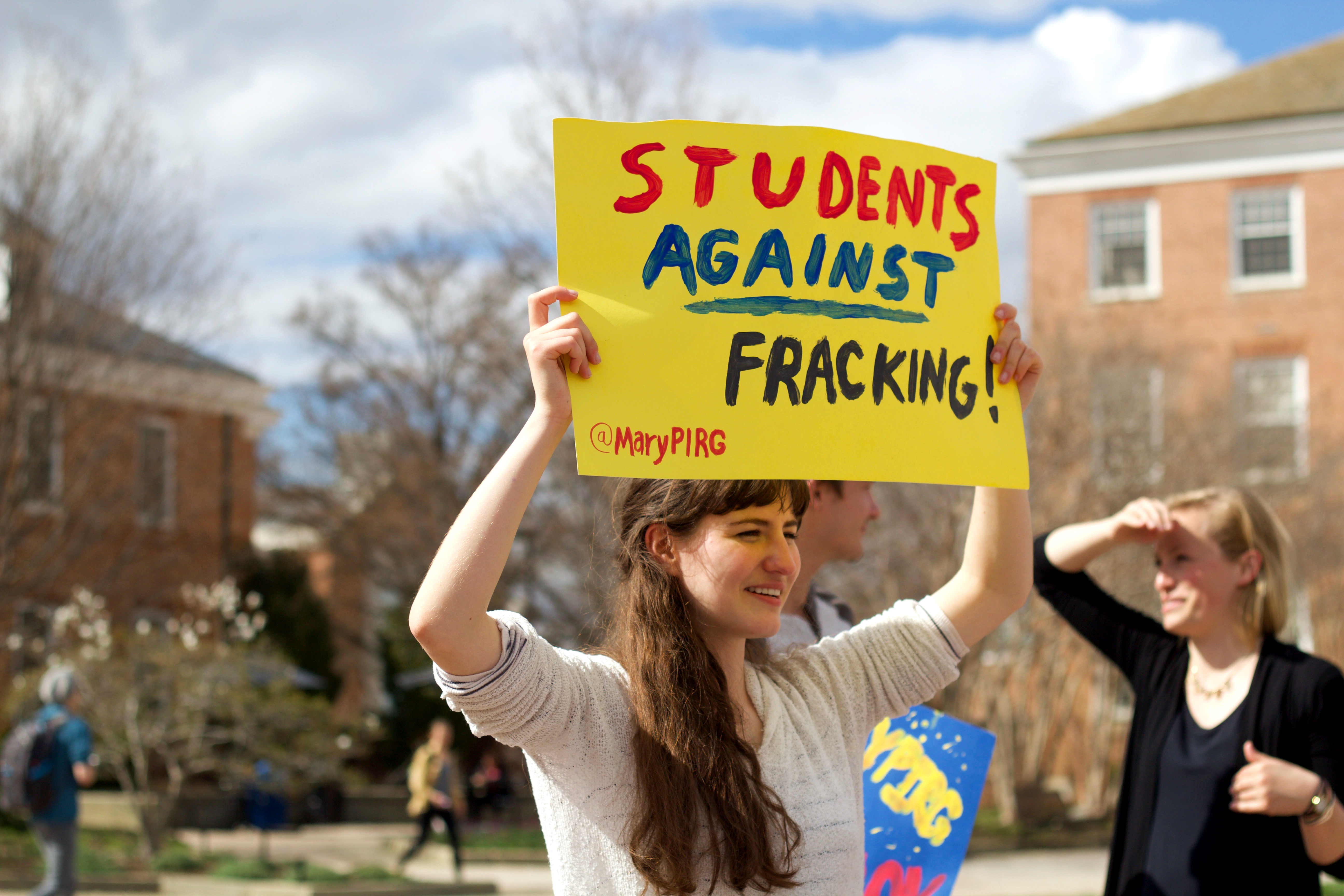MaryPIRG members held a demonstration Tuesday in Tawes Plaza to celebrate the Maryland General Assembly passing a law this week to permanently ban fracking in the state.
State lawmakers passed the law Monday with a 35-10 Senate vote to ban the drilling method, which involves injecting high-pressure water, sand and chemicals deep into an underground well to crack shale rock, releasing the natural gas stored inside. The permanent ban follows a two-and-a-half year moratorium on fracking in Maryland that was set to expire in October.
MaryPIRG has been lobbying state lawmakers this semester to ban fracking by visiting the Annapolis state house and testifying against the drilling method. Members have also tabled outside of the Stamp Student Union since the start of the semester, gathering more than 1,000 student signatures against fracking to show state lawmakers such as Gov. Larry Hogan, said Devorah Stavisky, MaryPIRG’s fracking ban coordinator.
[Read More: University of Maryland students want state lawmakers to permanently ban fracking]
The organization’s event was originally intended to raise awareness about the legislation, but turned into a celebration rally after the law passed Monday evening, said Julia Zhen, a sophomore supply chain management and information systems major. About 15 students were in attendance and wrote postcards thanking state lawmakers for passing the legislation.
Hogan, who previously supported fracking, announced March 17 that he approved the permanent ban, which Stavisky said was a “an amazing victory for the campaign” and “a pleasant surprise.”
“[Gov. Hogan’s support] shows that environmentalism isn’t a partisan issue,” said Stavisky, a sophomore sociology major. “Working across party lines to make change happen is one of the most effective ways we can continue making change.”
Caroline Riley, a sophomore English and Spanish major, said Hogan’s decision to support the ban is a testament to the effectiveness of grassroots organization.
“I care about having a planet for my grandkids [and] having safe food and water for everyone in Maryland to drink,” Riley said. “The best way to not feel upset or angry about those things is to get out and organize and do something. That’s why I’m personally here.”
Opponents of the drilling method claim fracking is linked to drinking water contamination, air pollution, earthquakes and other health and environmental risks. A 2016 EPA report found that fracking can “impact drinking water resources under some circumstances,” and that groundwater contamination is more likely when spills, improper injections, low water availability and improper disposal occur during the fracking process.
[Read More: Gov. Larry Hogan announces support for permanent fracking ban in Maryland]
Maryland will become the third state to ban the drilling method, following New York and Vermont, and is the first state that is capable of fracking to ban the practice. Before passing in the Senate, the House of Delegates approved the legislation on March 10 with a 97-40 vote.
Hogan’s move to support a ban on fracking could prompt other governors to follow suit, especially with reelection coming up in 2018, Zhen said.
“[It puts] the pressure on these politicians to think about where they want to be and take a stance on issues like banning fracking and other clean energy,” Zhen said.
Ben Swartz, a senior biology major, said he joined MaryPIRG’s movement after seeing firsthand how fracking has affected his home state of Pennsylvania.
“Hopefully we can be an example for other states to lead,” Swartz said. “Even other states that do have fracking and are now maybe regretting it can follow through with a ban of their own.”



